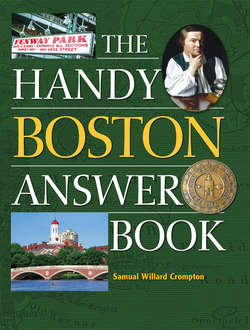Читать книгу The Handy Boston Answer Book - Samuel Willard Crompton - Страница 19
На сайте Литреса книга снята с продажи.
FORESHADOWING THE REVOLUTION
ОглавлениеMost of us know Boston either as “The Cradle of Liberty” or “The Athens of America.” Where did the phrase “Cradle of Violence” come from?
Historian Russell Bourne issued his book Cradle of Violence in 2006, and discussions of early maritime history have been better informed ever since. Bourne saw it as his job to free the Boston waterfront mobs from the negative impression most people had of them; he successfully argued that the Boston waterfront mobs were, in fact, vital to the winning of American independence. In his book, Bourne presented his first case, about the Knowles Riots of 1747, to readers who had never heard the story before.
Who was Commodore Knowles and why were there riots in 1747?
In 1747 Commodore John Knowles commanded the British vessels in and around Boston. Many of these ships had been involved in the Louisbourg expedition of 1745, and bad feelings lingered, especially between the Royal Navy sailors and the people of the Old North End. In November 1747, Knowles learned that thirty of his men had deserted, and, furious that they found shelter in Boston, he sent press gangs right into the heart of the town. The press gangs succeeded initially—they brought back forty-six men to replace the thirty that were lost—but they also evoked the anger of the Boston mob. Perhaps three hundred men participated in the initial resistance, but they were joined by perhaps two thousand others. Governor Shirley had to take refuge on Castle Island.
Not surprisingly, Commodore Knowles threatened to bombard the town, and there is no doubt he would have singled out the North End for special punishment. Governor Shirley was able to dissuade him, and Knowles sailed away a few weeks later, but lingering fears and suspicions developed. Was the Boston mob truly this unruly? Why was the civil authority unable to deal with the situation?
Was there any way to differentiate a native Bostonian—in around the year 1750—from a recent arrival?
True Bostonians claimed they could tell the difference in a heartbeat (some of their descendants make that claim today). The native Bostonian tended to be cool on first acquaintance, but if he or she became a friend, it was usually as a friend for life. The average Bostonian tended to be more concerned with nautical matters than with agricultural ones, and to be keen on learning everything possible about what transpired in other parts of the Atlantic world.
Where was Benjamin Franklin during the 1750s?
Franklin was by now the leading citizen of Quaker Philadelphia, and he had long since shaken the dust of Boston from his boots. Franklin was farsighted enough, however, to see that the calendar change might be followed by other innovations, and he was one of the first of all colonial Americans to propose a colonial congress. Franklin’s proposal, known as the Albany Plan of Union, was debated at Albany in the summer of 1754, but was not brought to a vote.
How did Bostonians feel about some type of intercolonial government by the 1750s?
Two generations earlier, they would almost certainly have welcomed one. But by 1754, Boston was the third-largest town on the East Coast, behind New York and Philadelphia, and it no longer seemed certain that Boston would be the number-one political leader in such a union. Bostonians, therefore, were less keen on the idea of an intercolonial government at this time than in the past. Then too, the crisis that brought such considerations to the fore soon resulted in the French and Indian War, the fourth and last of these colonial conflicts.
How and why did Boston change from the Julian to the Gregorian calendar?
By 1750, the various English towns up and down the East Coast were in closer touch than ever before. England wished to standardize its relations with the American colonies and to ensure better regulation of what happened in America. One measure adopted as a means towards that end was the change from the Julian to the Gregorian calendar.
The Gregorian calendar had been used in France, Spain, and other European nations since 1582, but the Protestant nations, and their colonies, rejected it as a Popish innovation. In September 1752, Great Britain and her American colonies finally moved from the Julian to the Gregorian calendar. The difference between the two calendars was only eleven minutes per year, but when this was multiplied by the thousand-odd years since the Julian calendar was adopted, it was found necessary to “drop” eleven days from the Protestant calendar. September 3, 1752, was followed by September 14, and many people—on both sides of the Atlantic—protested, saying that they wanted their eleven days back.
